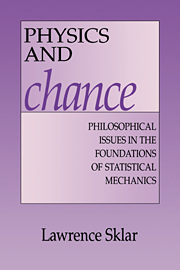Book contents
- Frontmatter
- Contents
- Preface
- 1 Introduction
- 2 Historical sketch
- 3 Probability
- 4 Statistical explanation
- 5 Equilibrium theory
- 6 Describing non-equilibrium
- 7 Rationalizing non-equilibrium theory
- 8 Cosmology and irreversibility
- 9 The reduction of thermodynamics to statistical mechanics
- 10 The direction of time
- 11 The current state of major questions
- References
- Index
- Frontmatter
- Contents
- Preface
- 1 Introduction
- 2 Historical sketch
- 3 Probability
- 4 Statistical explanation
- 5 Equilibrium theory
- 6 Describing non-equilibrium
- 7 Rationalizing non-equilibrium theory
- 8 Cosmology and irreversibility
- 9 The reduction of thermodynamics to statistical mechanics
- 10 The direction of time
- 11 The current state of major questions
- References
- Index
Summary
As is already clear from the preceding historical sketch of the development of foundational problems in statistical mechanics, the concept of probability is invoked repeatedly in the important discussions of foundational issues. It is used informally in the dialectic designed to reconcile the time-asymmetry of statistical mechanics with the time-reversibility of the underlying dynamics, although, as we have seen, its introduction cannot by itself resolve that dilemma. Again, informally, it is used to account for the existence of equilibrium as the macro-state corresponding to the “overwhelmingly most probable” micro-states, and to account for the approach to equilibrium as the evolution of microstates from the less to the more probable. More formally, the attempts at finding an acceptable derivation of Boltzmann-like kinetic equations all rest ultimately on attempts to derive, in some sense, a dynamical evolution of a “probability distribution” over the micro-states compatible with the initial macro-constraints on the system. The picturesque notion of the ensemble, invoked in the later work of Maxwell and Boltzmann and made the core of the Gibbs presentation of statistical mechanics, really amounts to the positing of a probability distribution over the micro-states of a system compatible with its macro-constitution, and a study of the changes of such a distribution over time as determined by the underlying dynamics.
- Type
- Chapter
- Information
- Physics and ChancePhilosophical Issues in the Foundations of Statistical Mechanics, pp. 90 - 127Publisher: Cambridge University PressPrint publication year: 1993



